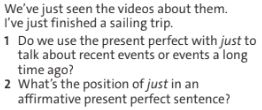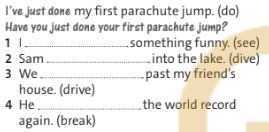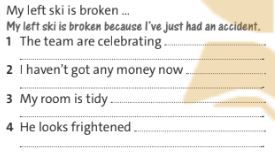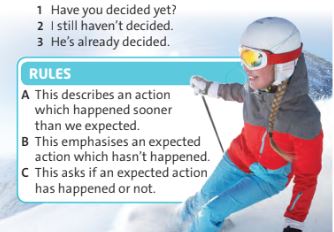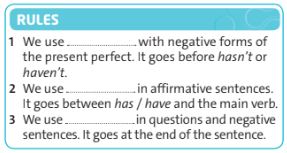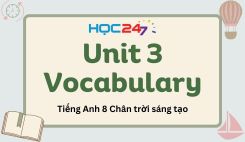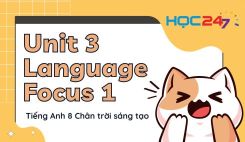Thì Hiện tại hoàn thành được dùng khi nào? Thì Hiện tại hoàn thành khi kết hợp với các từ như “just” hay “still, yet and already” sẽ có ý nghĩa khác nhau như thế nào? Lesson Language Focus 2 của Unit 3 Adventure Tiếng Anh 8 Chân trời sáng tạo do HOC247 biên soạn sẽ giúp các em nắm vững tất cả các nội dung liên quan đến Thì Hiện tại hoàn thành. Mời các em cùng theo dõi nội dung chi tiết bài học ngay bên dưới.
1.1. Unit 3 lớp 8 Language Focus 2 Task 1
1.2. Unit 3 lớp 8 Language Focus 2 Task 2
1.3. Unit 3 lớp 8 Language Focus 2 Task 3
1.4. Unit 3 lớp 8 Language Focus 2 Task 4
1.5. Unit 3 lớp 8 Language Focus 2 Task 5
1.6. Unit 3 lớp 8 Language Focus 2 Task 6
1.7. Unit 3 lớp 8 Language Focus 2 Task 7
1.8. Unit 3 lớp 8 Language Focus 2 Task 8
Tóm tắt bài
1.1. Unit 3 lớp 8 Language Focus 2 Task 1
Present perfect simple + just
Study these sentences from exercise 3 on page 34. Then answer the questions.
(Nghiên cứu những câu này từ bài tập 3 trên trang 34. Sau đó trả lời các câu hỏi.)
Guide to answer
1. We use the present perfect with just to talk about recent events.
(Chúng ta sử dụng thì hiện tại hoàn thành với just để nói về các sự kiện gần đây.)
2. The position of just in an affirmative present perfect sentence is after ‘have, has’ and before main verb.
(Vị trí của just trong câu khẳng định thì hiện tại hoàn thành là sau ‘have, has’ và trước động từ chính.)
1.2. Unit 3 lớp 8 Language Focus 2 Task 2
Complete the sentences with just and the present perfect simple form of the verbs in brackets. Then write the question form.
(Hoàn thành các câu với just và thì hiện tại hoàn thành của các động từ trong ngoặc. Sau đó viết dạng câu nghi vấn.)
Guide to answer
1. I’ve just seen something funny.
(Tôi vừa thấy một thứ gì đó buồn cười.)
Have you just seen something funny?
(Có phải bạn vừa thấy một thứ gì đó buồn cười?)
2. Sam’s just dived into the lake.
(Sam vừa lặn xuống hồ.)
Has Sam just dived into the lake?
(Có phải Sam vừa lặn xuống hồ không?)
3. We’ve just driven past my friend’s house.
(Chúng tôi vừa lái xe qua nhà bạn tôi.)
Have we just driven past your friend’s house?
(Chúng ta vừa lái xe qua nhà bạn của bạn à?)
4. He’s just broken the world record again.
(Anh ấy vừa phá kỷ lục thế giới một lần nữa.)
Has he just broken the world record again?
(Có phải anh ấy vừa phá kỷ lục thế giới một lần nữa?)
1.3. Unit 3 lớp 8 Language Focus 2 Task 3
Explain the situations with your own words. Use the correct present perfect simple form with because and just.
(Giải thích các tình huống bằng từ của riêng bạn. Sử dụng đúng dạng hiện tại hoàn thành đơn với because và just.)
Guide to answer
1. The team is celebrating because they’ve just won the championship.
(Cả đội đang ăn mừng vì họ vừa đoạt chức vô địch.)
2. I haven’t got any money now because I’ve just bought a smartphone.
(Bây giờ tôi không có tiền vì tôi mới mua một chiếc điện thoại thông minh.)
3. My room is tidy because I’ve just cleaned it up.
(Phòng của tôi gọn gàng bởi vì tôi vừa mới dọn dẹp xong.)
4. He looks frightened because he’s just seen a snake.
(Anh ấy trông có vẻ sợ hãi vì anh ấy vừa nhìn thấy một con rắn.)
1.4. Unit 3 lớp 8 Language Focus 2 Task 4
Present perfect simple + still, yet and already
Study sentences 1-3. Then match them with rules A-C.
(Nghiên cứu các câu 1-3. Sau đó ghép chúng với quy tắc A-C.)
Guide to answer
1. Have you decided yet? - C. This asks if an expected action has happened or not.
(Bạn đã quyết định chưa? - Điều này hỏi liệu một hành động dự kiến đã xảy ra hay chưa.)
2. I still haven't decided. - B. This emphasises an expected action which hasn't happened.
(Tôi vẫn chưa quyết định. - Điều này nhấn mạnh một hành động dự kiến đã không xảy ra.)
3. He's already decided. - A. This describes an action which happened sooner than we expected.
(Anh ấy đã quyết định rồi. - Câu này diễn tả một hành động xảy ra sớm hơn chúng ta mong đợi.)
1.5. Unit 3 lớp 8 Language Focus 2 Task 5
Complete the rules with still, yet or already.
(Hoàn thành các quy tắc với still, yet hoặc already.)
Guide to answer
RULES (Quy tắc)
1. We use still with negative forms of the present perfect. It goes before hasn't or haven't.
(Chúng ta dùng still với dạng phủ định của thì hiện tại hoàn thành. Nó đi trước hasn't hoặc haven't.)
2. We use already in affirmative sentences. It goes between has/have and the main verb.
(Chúng ta dùng already trong câu khẳng định. Nó đứng giữa has/have và động từ chính.)
3. We use yet in questions and negative sentences. It goes at the end of the sentence.
(Chúng ta dùng yet trong nghi vấn và câu phủ định. Nó đứng cuối câu.)
1.6. Unit 3 lớp 8 Language Focus 2 Task 6
Order the words to make sentences.
(Sắp xếp các từ để tạo thành câu.)
Guide to answer
1. My friends and I have already decided on our next adventure.
(Bạn bè của tôi và tôi đã quyết định về chuyến phiêu lưu tiếp theo.)
2. I've already borrowed a surfboard.
(Tôi đã mượn một chiếc ván lướt sóng.)
3. We still haven't organised transport.
(Chúng tôi vẫn chưa tổ chức việc vận chuyển.)
4. We haven't bought any food yet.
(Chúng tôi vẫn chưa mua thức ăn.)
1.7. Unit 3 lớp 8 Language Focus 2 Task 7
Read Nam's wish list. Write sentences about what he has and hasn't done. Use still, yet and already.
(Đọc danh sách mong muốn của Nam. Viết câu về những gì anh ấy đã và chưa làm. Dùng still, yet và already.)
Guide to answer
1. Nam still hasn’t seen Dambri Waterfall.
(Nam vẫn chưa được ngắm thác Dambri.)
2. Nam has already tried surfing.
(Nam đã thử lướt sóng rồi.)
3. Nam has already sailed aorund Hạ Long Bay.
(Nam đã chèo thuyền qua vịnh Hạ Long rồi.)
4. Nam hasn’t climbed up Fansipan yet.
(Nam chưa leo lên đỉnh Fansipan.)
1.8. Unit 3 lớp 8 Language Focus 2 Task 8
USE IT! Think about what you have and haven’t done today, this year and in your life. Write sentences about each time period with the present perfect and still, yet or already.
(Hãy suy nghĩ về những gì bạn đã làm và chưa làm hôm nay, năm nay và trong cuộc sống của bạn. Viết câu về mỗi khoảng thời gian với hiện tại hoàn thành và still, yet hoặc already.)
Guide to answer
- I’ve already visited Ho Chi Minh Mausoleum.
(Tôi từng đi thăm Lăng Bác rồi.)
- I haven’t played basketball yet.
(Tôi chưa từng chơi bóng rổ.)
- I still haven’t been to piano class this week.
(Tôi chưa đến lớp học đàn tuần này.)
Finished?
Look at the photos on pages 30-35. Write sentences about what each person has just done, or hasn't done yet.
(Nhìn vào các bức ảnh ở trang 30-35. Viết câu về những gì mỗi người vừa làm hoặc chưa làm.)
Guide to answer:
- He has already surfed in the Iguazu Falls.
(Anh ấy đã lướt sóng ở thác Iguazu rồi.)
- Gary has just dived off a 27-metre-high cliff into the lake.
(Gary vừa lao từ vách đá cao 27m xuống hồ.)
- She hasn’t climbed up Everest yet.
(Cô ấy chưa từng leo lên đỉnh Everest.)
Bài tập minh họa
Read the following passage and mark the letter A, B, C, or D on your answer sheet to indicate the correct answer to each of the questions.
It is often considered that the schoolyard is where bullies go to make other kids a miserable school life, but a new study suggests that classrooms are another popular place.
The study, presented recently at the American Public Health Association’s yearly meeting in Philadelphia, is based on the results of the research from more than 10,000 middle school students who answered questions online.
Of those researched, 43% said they’d been physically bullied within the last month. A bit more than half said they had been laughed at in an unfriendly way, and half reported being called hurtful names. About one third said groups had excluded them to hurt their feelings. 28% said their belongings had been taken or broken; 21% said someone had threatened to hurt them. According to the results, two-thirds of the students said they had been bullied in more than one way over the previous month.
The study authors mentioned that 8% of the students who answered said they had missed school at least once during the school year because of fear of being bullied, 25% said they had taken other actions, such as missing recess, not going to the bathroom or lunch, missing classes, or staying away from some area of the school to escape from experiencing a bully. Bullies did too much to the school life.
Question 1. Bullies can happen in the following places EXCEPT_________.
A. schoolyards
B. classrooms
C. bathrooms
D. teachers’ offices
Question 2. The underlined phrase “laughed at” in the passage is closest in meaning to_________.
A. made fun of
B. smiled nicely
C. shouted at
D. looked after well
Question 3. Which of the following might some students do to protect themselves from bullies?
A. They miss school.
B. They call their parents for help.
C. They try to hurt others.
D. They break others’ belongings
Question 4. How does the writer feel about bullies at school?
A. Excited
B. Disappointed
C. Worried
D. Puzzled
Question 5. Which of the following is probably the best title for the passage?
A. Bad School Life
B. Bullies at school
C. Fear at school
D. School problems
Key (Đáp án)
Question 1: D
Question 2. A
Question 3. A
Question 4. C
Question 5. B
Luyện tập
3.1. Kết luận
Qua bài học này các em cần ghi nhớ cách dùng just, still, already, yet với thì hiện tại hoàn thành như sau:
- Just dùng để chỉ hành động mới xảy ra gần đây. Just đứng sau trợ động từ và trước phân từ 2 trong thì hiện tại hoàn thành.
Ví dụ: I’ve just seen Susan coming out of the cinema. (Tôi vừa thấy Susan đi ra khỏi rạp chiếu phim.)
- Already để chỉ hành động kết thúc sớm hơn dự kiến. Already đứng giữa trợ động từ và phân từ 2.
Ví dụ: I’ve already spent all my salary. (Tôi xài hết tiền lương rồi.)
- Yet sử dụng trong câu phủ định hoặc nghi vấn, thể hiện hành động được kỳ vọng sẽ xảy ra. Yet thường đứng cuối câu.
Ví dụ: Has your course started yet? (Khóa học của bạn đã bắt đầu chưa?)
- Still diễn tả một sự việc diễn ra trong quá khứ nhưng vẫn chưa có dấu hiệu kết thúc ở thời điểm hiện tại. Still đứng trước động từ thường và đứng sau động từ tobe.
Ví dụ: I still haven’t finished writing my essay. (Tôi vẫn chưa hoàn thành việc viết bài văn.)
3.2. Bài tập trắc nghiệm Unit 3 - Language Focus 2
Như vậy là các em đã xem qua bài giảng phần Unit 3 - Language Focus 2 chương trình Tiếng Anh lớp 8 Chân trời sáng tạo. Để củng cố kiến thức bài học mời các em tham gia bài tập trắc nghiệm Trắc nghiệm Unit 3 lớp 8 Chân trời sáng tạo Language Focus 2 - Ngữ pháp 2.
Câu 4-10: Mời các em đăng nhập xem tiếp nội dung và thi thử Online để củng cố kiến thức về bài học này nhé!
Hỏi đáp Unit 3 - Language Focus 2 Tiếng Anh 8
Trong quá trình học tập nếu có thắc mắc hay cần trợ giúp gì thì các em hãy comment ở mục Hỏi đáp, Cộng đồng Tiếng Anh HOC247 sẽ hỗ trợ cho các em một cách nhanh chóng!
Chúc các em học tập tốt và luôn đạt thành tích cao trong học tập!
-- Mod Tiếng Anh 8 HỌC247


